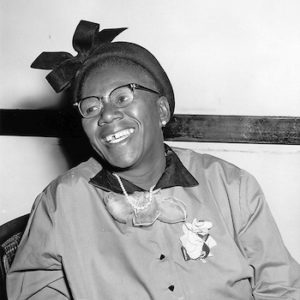
Frances Baard
*Frances Baard was born on this date in 1909. She was a South African activist, trade unionist, and organizer.
Frances Goitsemang Maswabi was born Frances Maswabi in Green Point, Beaconsfield, Kimberley, South Africa. Her father was Herman Maswabi from Ramotswa in Botswana, and her mother, Sarah Voss, was a Tswana person from Kimberley. She attended the Racecourse Primary School and the Lyndhurst Road School in Malay Camp, Kimberley. She worked briefly as a teacher and then, moving to Port Elizabeth, as a domestic servant and a factory worker.
She married Lucas Baard in Port Elizabeth in 1942, having known him from childhood in Kimberley. In 1948, Baard joined the African National Congress because of her experiences of oppression and exploitation under Apartheid. She was an organizer in the ANC's Women's League in 1952 during the Defiance Campaign, serving later in various posts, including Secretary and Treasurer of the League's Port Elizabeth branch. In the mid-1950s, she served as National Treasurer of the Women's League. She was also an executive committee member and local Port Elizabeth branch President of the Federation of South African Women (FEDSAW).
In 1955, Baard was actively involved in drafting the Freedom Charter and was one of the leaders of the Women's March to the Union Buildings in Pretoria on August 9, 1956, in protest of the pass laws. "A pass is this little book you must get when you are 16, and it says where you can work, and where you can be, and if you have got work. You can't get a job without this book. And you can only get a job where they stamp your pass to say 'Johannesburg' or 'Pretoria' and so on. You must carry it with you all the time because the police can ask you, 'Where is your pass?' any time, and then you must show them. If you haven't got your pass, they put you in jail for some days or else you must pay some money to get out." – Frances Baard, in "My Spirit is Not Banned."
In 1956, she was one of the defendants in the Treason Trial and became an executive committee member of the South African Congress of Trade Unions (SACTU). She was arrested in 1960 and 1963 when she was kept in solitary confinement for 12 months. In 1964, she was arrested yet again and sentenced to 5 years imprisonment. Her children were taken care of by relatives in Port Elizabeth and Kimberley. Following her release in 1969, she was banished to Boekenhout, moving two years later when her banning order expired to Mabopane (near Pretoria).
In August 1983, Frances Baard attended the launch of the United Democratic Front (UDF) in Cape Town as a Patron and executive member. Baard was a member of the Methodist Church and its Women's Guild. She died in 1997.
In 2001, the "Diamantveld District Council," Kimberley, was renamed Frances Baard District Municipality in honor of Frances Baard. In August 2009, a bronze statue was unveiled in Kimberley to commemorate her role in the Women's March in 1956. The granite plinth inscribes the famous remark from her autobiography: "My spirit is not banned—I still say I want freedom in my lifetime."
Baard is also remembered for renaming Schoeman Street (named after State President Stephanus Schoeman) in Pretoria, where the spelling in street signs and on maps is "Francis Baard." Baard's granddaughter, Mummy Baard, remarked, "The Tshwane Metro Council is right in using 'Francis' on its new street name." Asked why, in contrast, the Frances Baard District Council uses a different spelling, she suggested that "maybe they decided to go for the 'Coloured version' of the name."